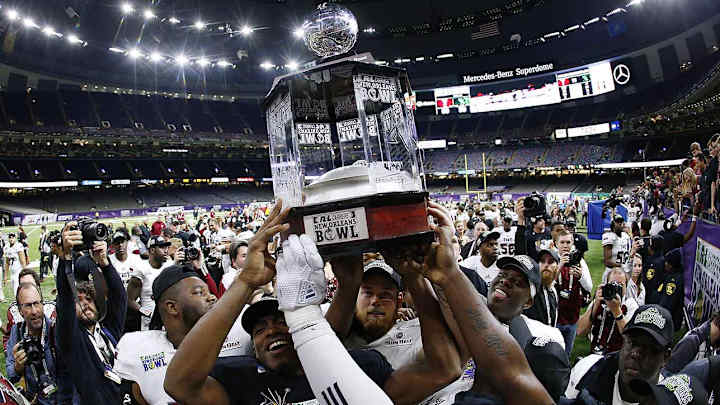The New Orleans Bowl Isn't the Same Without Teams From Louisiana

The matchup that should probably constitute the New Orleans Bowl will kick off 7.5 hours earlier than the Superdome’s first postseason football event of 2018, and about 650 miles southeast of Louisiana. That’s the Cure Bowl, to be clear, which will be played in Orlando at 1:30 p.m. ET on Saturday and pits Tulane against Louisiana in a rematch of the 2013 New Orleans Bowl.
That game will entail a nine-hour drive or a roughly $200 flight for any and all fans of the Green Wave and Ragin’ Cajuns who want to make the trip for a bowl between two teams that flirted with .500 all year, and nearly everyone who does make that trip will agree the game would make a lot more sense as a New Orleans Bowl.
This year marks the second in a row in which the New Orleans Bowl won’t include a team from the state of Louisiana after six straight seasons of at least one Bayou State team getting a bid. From 2011 to ’16, Louisiana went five times to the New Orleans Bowl, Tulane once, and Louisiana Tech once. Now, all three teams are bowl-eligible—but headed elsewhere, for a variety of reasons. And although this isn’t exactly a topic that will spark mass outrage, it’s meaningful. Over the past decade, the New Orleans Bowl has become the closest thing bowl season has to a kick-off event, held at an NFL stadium in a city with deep football traditions. Since 2010, it has been the primetime matchup on the first Saturday of bowl season. It draws fans in to the most fun and frivolous part of the college football season, and the game at its best has had an element of local flavor, loading up the Superdome with local fans.
Bowl Gift Guide: Ranking Every Game's Swag Packages | Bowl Watchability Rankings
Until last year. Thanks in part to realignment and in part to the affiliated conferences’ flexibility with bowl assignments, the 2017 New Orleans Bowl saw Troy, which split the Sun Belt championship, face North Texas, Conference USA’s runner-up. A Louisiana representative was conspicuously absent, as were players from the state; there were a total of four on the two rosters.
This year, it’s Appalachian State, the outright Sun Belt champion whose head coach Scott Satterfield has been hired away by Louisville, against Middle Tennessee, another C-USA runner-up. That doesn’t bode well for attendance, which dropped last year to its lowest since 2005, when the game was played in Lafayette, La., in the aftermath of Hurricane Katrina. The 24,904 mark was a far cry from the game’s high point of 54,728, which came in 2013 for a matchup between Tulane and Louisiana-Lafayette. Over the six-year run in which at least one Louisiana team appeared every season, the game averaged more than 41,000 in the Superdome seats.
Fans from Murfreesboro, Tenn., and Boone, N.C., will have a long way to travel to New Orleans, and the game will lack the local, or even regional, ties it managed to establish over the better part of a decade. (This year’s tally of players from Louisiana: zero.) It’s hard to blame anyone or anything but logistics for this outcome: Louisiana lost its chance at a New Orleans Bowl berth on the field when it couldn’t knock off Appalachian State in the conference title game, and Conference USA’s lone in-state team, Louisiana Tech, is not an ideal opponent for another conference’s champion, having finished third in its division; the Bulldogs are bound for the Hawaii Bowl. (Tulane left Conference USA for the American Athletic Conference in 2014 and is no longer eligible.)
The only thing that tops New Orleans during the week of a bowl is New Orleans during the week of a bowl that has a Louisiana team in it. When LSU gets into the Sugar Bowl, the city is overrun, say the few people present whose memories weren’t erased by hand grenades and hurricanes on Bourbon Street. Hell, the city even shuts down for the Bayou Classic—a game with even lower stakes than the New Orleans Bowl—between in-state HBCUs Grambling State and Southern the weekend after Thanksgiving. And as college football’s postseason continues to see its traditions eroded by realignment and the playoff system, the sport should try to hold onto the shreds of local color that it can, even among the lower-tier bowls.
So here’s hoping the Ragin’ Cajuns win the Sun Belt next year, or Louisiana Tech rises closer to the top of Conference USA. In the meantime, the New Orleans Bowl seems to be on vacation in Orlando.

Staff writer Joan Niesen returned to SI in 2014 after first coming to SI as an intern while in graduate school. She covers college football and the NFL.